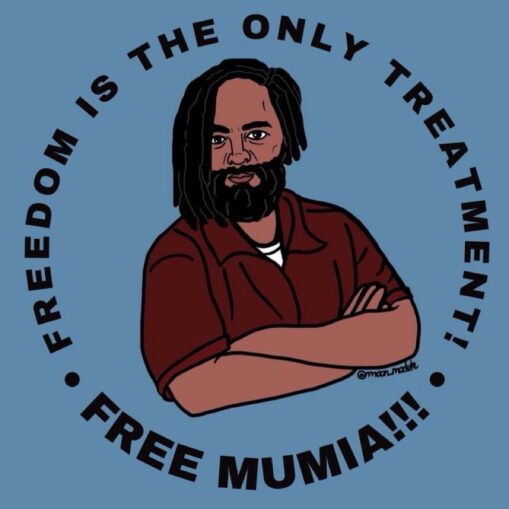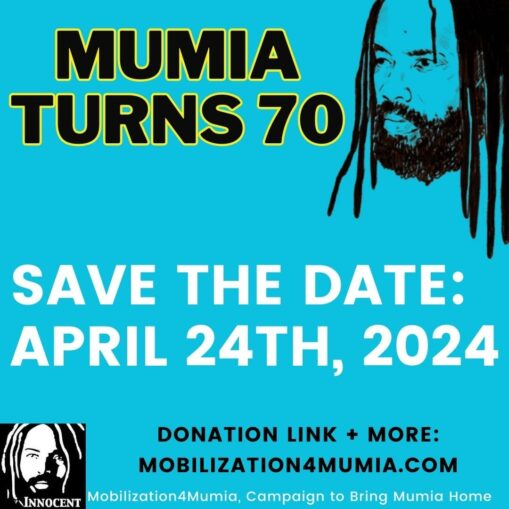After years of prison neglect, Mumia Abu-Jamal’s health deteriorates
Family, friends and supporters of political prisoner Mumia Abu-Jamal are once again sounding the alarm regarding his deteriorating health. Recent visitors are reporting that the severe long-term skin condition that causes him great discomfort, including painful around-the-clock itching, has returned with a vengeance.
Mumia, who will turn 70 on April 24, has been unjustly incarcerated for over 42 years, much of that time in solitary confinement on death row in Pennsylvania. In late 2011, he was finally released from death row and moved into the general population at SCI Mahanoy, where he is serving a life sentence without the possibility of parole – in other words, death by incarceration.
As a result of a 2016 appeal filed by attorneys Judith Ritter and Sam Spital, in late December 2018 Common Pleas Judge Leon Tucker granted Mumia the right to appeal his 1982 murder conviction. In early 2019, new evidence was discovered by the attorneys in six previously undisclosed evidence boxes uncovered by Philadelphia District Attorney Larry Krasner.
However, in late March 2023, Mumia’s ongoing legal battle for release was dealt a setback when Judge Lucretia Clemons from the Philadelphia County Court of Common Pleas filed notice of her intent to dismiss Abu-Jamal’s appeal petition based on that new evidence. Appeals of Clemons’ ruling are in process.
With ample evidence of police, prosecutorial and judicial misconduct in the case, supporters continue to demand that Krasner use his authority to free Mumia.
Years of medical neglect
Years of poor prison diet, limited exercise and possibly toxic prison water have jeopardized the health and wellbeing of Mumia and all the other incarcerated men who are experiencing skin irritation and unexplained sores. Since 2016, Mumia has experienced bloodied open wounds all over his body, severe itching and hardening, leather-like skin conditions, thought to be related to a hepatitis C infection which had gone untreated for years.
After taking the Pennsylvania Department of Corrections (PA DOC) to court in January 2017, Mumia won a lawsuit when U.S. District Court Judge Robert D. Mariana determined that not awarding Mumia treatment for hepatitis C would be “cruel and unusual punishment.” But the unnecessary delay in treatment appears to have left him with other health issues.
In March 2021, Mumia lost 30 pounds while ill from COVID-19; at the same time he was still dealing with the severe skin condition. On April 19, 2021, he underwent double bypass heart surgery. His doctor then prescribed a cardiac-healthy diet and regular exercise. However, for nearly three years the prison has failed to provide Mumia with the required diet. Exercise for all prisoners at SCI Mahanoy, including Mumia, has been restricted for months.
Prisoners deserve health care!
Activists concerned not just with Mumia’s health, but also with the prison conditions impacting thousands of aging incarcerated people, issued a Call to Action beginning Feb. 15.
Calls on behalf of Mumia should be made to the following prison officials, weekdays between 9 a.m. and 4 p.m. ET: Superintendent at SCI Mahanoy Bernadette Mason, 570-773-2158; and Secretary of Corrections at PA DOC, Dr. Laurel R. Harry, 717-728-4109; and Deputy Secretary Central Region, Robert Gimble 717-728-4122, ext. 4123.
A suggested sample script is: “Mumia Abu-Jamal (aka Wesley Cook) #AM 8335, had double bypass heart surgery in 2021 and has had other serious health issues, including COVID 19 and hepatitis C. We are therefore demanding that Mumia be provided with regular daily exercise, clean water, a cardiac-healthy diet and preventive care and screening.”
The Call to Action concludes with this statement by the American Medical Association Journal of Ethics: “There are legal, ethical, social and public health reasons why prisoners, as wards of the state, must be supplied with health care. The legal reasons for providing health care to prisoners were stipulated in the 1976 Supreme Court Estelle v. Gamble decision, in which the Court held that deprivation of health care constituted cruel and unusual punishment, a violation of the Eighth Amendment to the Constitution.” 

